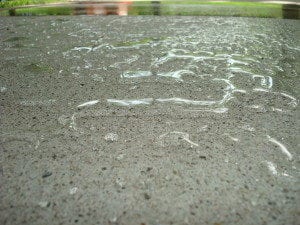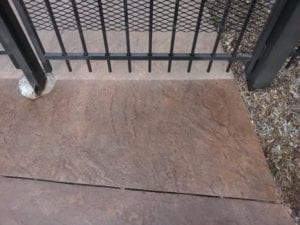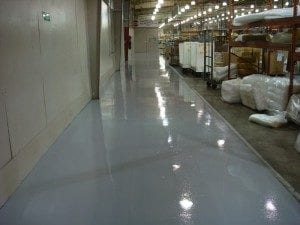SEALED CONCRETE & WHAT TO LOOK OUT FOR WHEN IT NEEDS TO BE SEALED AGAIN
Sealed concrete is an important factor to prolong the lifespan of your concrete. Depending on what type of sealer you have applied to the concrete, you will want to watch out for when it is time to re-seal it. Concrete, like any other porous surface, is best when it is sealed. You can seal concrete with a chemically reactive penetrating sealer, acrylic–resin sealers, and highperformance topical coatings, such as epoxies and urethanes. Depending on which one, if any, has already been applied to the concrete substrate, you will need to check and make sure the sealer is still sealing the concrete.
Concrete needs sealed for different purposes, some of which are: protecting it from freeze-thaw, stain repellence, dust reduction, abrasion resistance, chemical resistance, or to maintain an attractive or high-gloss appearance. If you do not seal your concrete, harsh chemicals and liquid can penetrate the concrete, leaving it discolored or destroy the surface. Let’s look at each sealer, so that you can know how long it should last and what do to check if it needs reapplied.
PENETRATING SEALERS

Due to the nature of penetrating sealers, since they chemically react to the concrete, they will last the longest out of all the sealers. They will generally wear as the substrate wears, usually 10 years or longer. They are usually applied directly after the concrete slab is poured, when it can withstand the weight of the installer. Although some reactive penetrating sealers, like silanes and siloxanes, should only be applied when the concrete is fully cured (generally 28 days). You will not notice a different appearance when penetrating sealer is applied, however, you will notice that when water is poured on top of the chemically sealed concrete, it will bead. This is the best test you can do to see if your concrete needs resealed. Pour water on the concrete, and if in a couple minutes, the concrete absorbs the water, you know it is time to reseal it.
ACRYLIC-RESIN SEALERS

One part sealed, one part not
There are two types of acrylic sealers: water-based and solvent based, both of which have shorter life spans than both penetrating sealers and epoxies. They generally last 1 to 3 years. They, like most penetrating sealers, are usually applied directly after the concrete slab is poured, when it can withstand the weight of the installer. Solvent-based acrylic resin sealers significantly enhance the color and give the concrete a high-gloss, wet look. Therefore, it is often the sealer of choice for stamped concrete projects. Water-based acrylic resin sealers, on the other hand, offer a more moderate color enhancement and a satin appearance. To test if you need to reseal your acrylic sealed concrete, check for wear and tear in it within the first year; you will likely see chips or peeling in spots.
EPOXIES AND URETHANES

Epoxy and urethane systems have similar performance to penetrating sealers, lasting 5 to 10 years, depending on traffic exposure. They are more expensive than other sealers up front, but they will last you longer than the alternatives, which are usually acrylic sealers. Most high performing sealers, like epoxies and urethanes, should only be applied after the concrete has cured (generally 28 days). Epoxies provide a significant color enhancement and give concrete the high-gloss, wet look, like solvent-based acrylic resin sealers. Urethanes, when applied as a topcoat over epoxy, are available in a wide range of finishes, from matte to glossy. Many sealers can also be colored with translucent or opaque tints. To test if you need to reapply epoxy or urethane, watch if areas start to lose their gloss or color, or both. You will also notice, in cases where it is bad, the concrete substrate will show throw the epoxy or urethane coatings.
To sum it up, acrylic sealers and penetrating sealers will repel water and deicing salts. Use a siliconate (a type of reacting penetrating chemical sealer) to repel oil stains. Some things to be aware of when choosing what type of sealer to use: 1, acrylic-resin sealers may be weakened by petroleum distillates, and 2, reacting penetrating sealers are generally weakened by acidic chemicals that etch the concrete. Opt for an epoxy or urethane system if you want protection against these substances. For penetrating sealers, watch for the concrete either absorbing water or beading; for acrylic sealers, watch for wear and tear, such as scratches and peeling; for epoxies and urethanes, watch for the glossy finish losing its shine or areas that are worn down and showing the concrete substrate.

